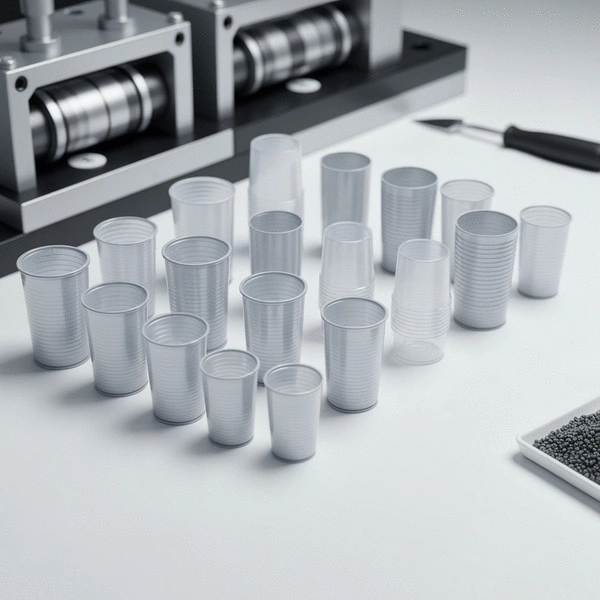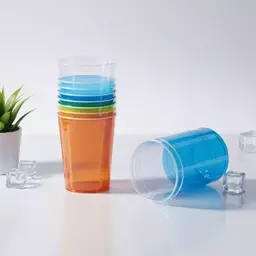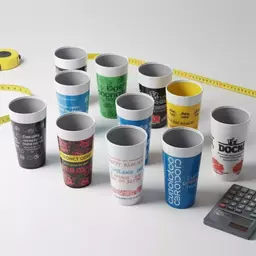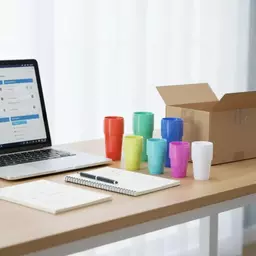The plastic cup market is versatile and essential across various industries. As a wholesale buyer, understanding the core aspects of plastic cup manufacturing can lead to better purchasing decisions. Here’s what you will gain from this article:
What You Will Learn
- The importance of plastic cups in industries like food service, events, retail, and health.
- Different types of plastics used in manufacturing, including polypropylene and polyethylene terephthalate.
- Key markets to target for wholesale plastic cups to maximize sales potential.
- The significance of customization in enhancing product offerings and brand visibility.
- Understanding production techniques and materials to ensure high-quality products.
- How to balance cost, quality, and sustainability in your sourcing strategy.
- Key factors to consider when choosing a reliable supplier for plastic cups.
Key Aspects of Plastic Cup Manufacturing for Wholesale Buyers
This visual highlights the critical elements and considerations for wholesale buyers navigating the plastic cup manufacturing landscape, from materials to market impact.
Key Markets for Plastic Cups
- ‣Food Service
- ‣Events & Parties
- ‣Retail Sales
- ‣Health Sector
Common Plastic Types & Uses
- ‣Polypropylene (PP): Heat resistant
- ‣Polyethylene Terephthalate (PET): Clear, durable
- ‣High-Density Polyethylene (HDPE): Strong, impact resistant
- ‣Low-Density Polyethylene (LDPE): Flexible, squeeze bottles
Key Supplier Considerations
- ‣Track Record & Testimonials
- ‣Production Capabilities
- ‣Sustainability & Safety Compliance
- ‣Customer Support
Customization Benefits
- ‣Enhances Brand Visibility
- ‣Differentiates Products
- ‣Meets Specific Needs
- ‣Creates Memorable Experience
Understanding the Basics of Plastic Cup Manufacturing for Wholesale Buyers
As a wholesale buyer in the plastic products industry, understanding the basics of plastic cup manufacturing is crucial. At Plastic Cups Manufacturers, we recognize that the right choice in plastic cups can significantly affect your business's success. Let's dive into the significance of these versatile products and how they cater to various industries.
The Significance of Plastic Cups in Various Industries
Plastic cups play a vital role across numerous sectors, from food service to retail. Their lightweight nature and durability make them ideal for a wide range of applications. Did you know that disposable cups are particularly popular for outdoor events, catering services, and convenience stores? This versatility is essential for any wholesale buyer looking to meet diverse customer needs.
- Food and Beverage Service
- Events and Parties
- Retail Sales
- Health and Wellness Industries
These markets highlight the demand for high-quality plastic cups, and understanding them can help you make more informed purchasing decisions. By aligning your product offerings with these key markets, you can enhance your sales potential and cater to specific customer preferences.

Exploring the Versatility of Plastic Disposable Cups
Plastic disposable cups come in various shapes, sizes, and materials, making them suitable for all kinds of beverages—from coffee to cocktails! Their versatility allows businesses to customize products based on their unique requirements. For example, did you know some cups are designed to keep drinks hot while others are better suited for cold beverages? Knowing the differences helps you select the best options for your clients.
Key Markets for Wholesale Plastic Cups
Identifying the key markets you wish to target is essential for maximizing your impact. Here are some prominent markets to consider:
- Food Service: Restaurants, cafes, and catering services.
- Events: Weddings, corporate events, and outdoor festivals.
- Retail: Convenience stores, grocery chains, and specialty shops.
- Health Sector: Hospitals, clinics, and fitness centers.
By focusing on these markets, you can tailor your product offerings to meet specific needs, enhancing your business's appeal to potential buyers.
Raw Materials and Production Techniques in Plastic Cup Manufacturing
Understanding the raw materials and production techniques involved in plastic cup manufacturing is essential for wholesale buyers. The quality of materials directly impacts not just the final product but also your reputation in the market. At Plastic Cups Manufacturers, we prioritize using top-grade materials that align with industry standards for safety and sustainability.
Types of Plastics Used in Manufacturing Disposable Cups
Plastic cups can be made from several types of plastics, each offering distinct benefits. Here's a quick overview of the most common materials:
- Polypropylene (PP): Known for its high resistance to heat and flexibility.
- Polyethylene Terephthalate (PET): Ideal for clear cups, known for its durability and clarity.
- High-Density Polyethylene (HDPE): Strong and resistant to impact, great for various applications.
- Low-Density Polyethylene (LDPE): Offers flexibility and is often used for squeeze bottles.
Each of these plastics serves different purposes, and knowing their characteristics helps you make better purchasing decisions that meet your customers' specific needs.
Polypropylene (PP) vs. Polyethylene Terephthalate (PET)
When it comes to choosing between polypropylene (PP) and polyethylene terephthalate (PET), consider the intended use. PP is ideal for hot beverages, while PET is preferable for cold drinks due to its clarity and strength. Understanding these differences ensures that you select the right material for your cups, enhancing both functionality and presentation.
Pro Tip
When selecting plastic cups for your business, consider opting for biodegradable options. Not only do they cater to environmentally conscious consumers, but they also enhance your brand's reputation by showcasing your commitment to sustainability. This choice can significantly influence customer satisfaction and loyalty!
Summarizing Key Insights for Wholesale Buyers in Plastic Cup Manufacturing
As we dive into the world of plastic cup manufacturing, it's crucial to recap the essential processes and considerations that can help wholesale buyers make informed decisions. Understanding the intricacies involved in production, customization, and sustainability can significantly impact your purchasing strategy. Let’s explore these insights together!
Firstly, we need to balance cost, quality, and sustainability. Every buyer faces the challenge of ensuring that the products they source not only meet quality standards but also come at a price that allows for healthy margins. Sustainability is increasingly becoming a key purchasing factor, so it’s vital to assess how your choices can reflect your commitment to the environment. For further reading on national strategies to prevent plastic pollution, you can refer to resources such as the EPA's National Strategy to Prevent Plastic Pollution, which provides comprehensive insights into responsible plastic use and disposal.
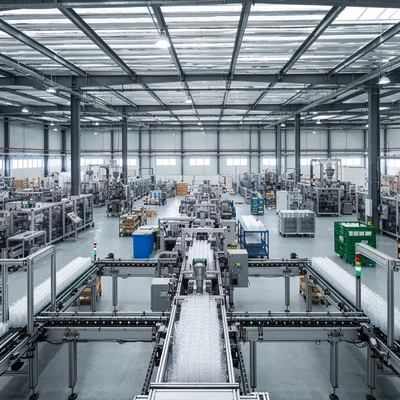
Recap of Essential Manufacturing Processes and Considerations
- Understanding the types of plastics available for manufacturing, such as polypropylene and polyethylene terephthalate.
- Familiarity with the production techniques like injection molding, extrusion, and blow molding.
- Awareness of food safety standards and regulations, including FDA compliance.
- The importance of customization options to tailor products that resonate with your brand identity.
These points form the backbone of an effective sourcing strategy. Each aspect helps streamline your supply chain and ensures that you’re providing high-quality products to your customers, which, in turn, boosts your business reputation!
Making Informed Decisions: Balancing Cost, Quality, and Sustainability
When it comes to making informed decisions, consider establishing criteria for evaluating suppliers. This includes assessing their commitment to sustainable practices, their pricing structure, and their ability to provide customization. By developing a checklist, you can simplify the decision-making process, ensuring that you choose a partner who aligns with your values and operational goals. For example, understanding initiatives like California's Packaging Extended Producer Responsibility programs can help you evaluate suppliers based on their adherence to evolving environmental regulations.
Moreover, remember that the initial cost is just one factor. Consider the long-term implications of your choices—investing in quality plastic cups might mean lower defect rates and better customer satisfaction over time!
How Customization Can Enhance Your Product Offerings
Customization plays a pivotal role in differentiating your products in a crowded market. By offering various sizes, colors, and designs, you not only meet specific customer needs but also enhance brand visibility. Imagine your logo prominently displayed on cups at events or gatherings—it’s a fantastic way to engage customers and boost brand awareness!
- Choose colors that reflect your brand identity.
- Offer different sizes to cater to various beverage options.
- Consider creative shapes that stand out.
At Plastic Cups Manufacturers, we pride ourselves on providing customizable options that resonate with your target audience. It’s about creating a memorable experience for your customers, and customization is the key to achieving that!
Frequently Asked Questions (FAQs)
What are the primary industries that utilize plastic cups?
Plastic cups are widely used across various industries, including food and beverage service, events and parties, retail sales, and the health sector.
What types of plastics are commonly used in manufacturing disposable cups?
Common plastics include Polypropylene (PP) for heat resistance, Polyethylene Terephthalate (PET) for clarity and durability, High-Density Polyethylene (HDPE) for strength, and Low-Density Polyethylene (LDPE) for flexibility.
How does customization benefit a wholesale buyer's product offerings?
Customization enhances brand visibility, differentiates products from competitors, meets specific customer needs, and helps create a memorable experience for consumers by offering unique sizes, colors, and designs.
What factors should be considered when choosing a reliable plastic cup supplier?
Key factors include the supplier's track record and testimonials, production capabilities, commitment to sustainability and safety compliance, and the quality of their customer support and post-purchase service options.
Why is balancing cost, quality, and sustainability important in sourcing plastic cups?
Balancing these elements ensures that products meet quality standards, are competitively priced for healthy margins, and align with growing consumer demand for environmentally responsible practices, enhancing brand reputation and customer loyalty.
Call to Action: Partnering with the Right Manufacturer for Success
Now that you’re equipped with these insights, it’s time to think about the next steps in your sourcing journey. Partnering with the right manufacturer can pave the way for your success in the plastic cups market. Let's delve into what to consider when choosing a supplier.
Choosing a Supplier: Key Factors to Consider
Identifying the right supplier is crucial for ensuring quality and reliability in your product offerings. Here are some key factors that I suggest considering:
- Evaluate their track record and customer testimonials.
- Assess their production capabilities and flexibility in meeting your demands.
- Check their commitment to sustainability and adherence to safety standards.
- Explore their customer support and post-purchase service options.
When you take these factors into account, you’re more likely to build a partnership that lasts. A reliable manufacturer can be a true asset in your business growth!
Building Long-Term Relationships with Manufacturers
Building long-term relationships with your suppliers fosters trust and can lead to better pricing, improved service, and collaborative innovation. Regular communication and feedback will keep both parties aligned and can lead to mutually beneficial outcomes. I encourage you to invest time in nurturing these relationships—it pays off!
Utilizing Industry Resources for In-Depth Research and Insights
Don’t hesitate to leverage industry resources such as trade shows, online forums, and industry reports. They can provide valuable insights into market trends and supplier performance, helping you stay ahead of the curve. Knowledge is power, and it can greatly influence your purchasing decisions!
Understanding Supply Chain Management in Plastic Manufacturing
Finally, understanding the intricacies of supply chain management can help streamline your operations. Knowing where your materials come from and how they are processed can enable you to make more informed choices and anticipate challenges. With the right knowledge, you can achieve optimal efficiency in your supply chain.
Ready to take the next step? Partner with Plastic Cups Manufacturers for high-quality, sustainable plastic cup solutions tailored to your needs. Let’s work together to create exceptional products that your customers will love!
Recap of Key Points
Here is a quick recap of the important points discussed in the article:
- Understand the significance of plastic cups across various industries, including food service, events, retail, and health sectors.
- Familiarize yourself with different types of plastics used in manufacturing, such as polypropylene (PP) and polyethylene terephthalate (PET), and their respective benefits.
- Focus on customization options to enhance brand visibility and meet specific customer needs.
- Evaluate suppliers based on their sustainability practices, production capabilities, and customer testimonials.
- Balance cost, quality, and sustainability to ensure effective sourcing strategies that align with market demands.

